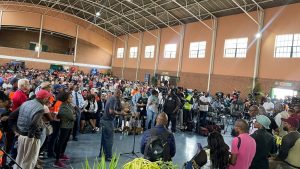When Frans Manganyi woke up on a chilly Friday morning from one of the close to 25 000 shacks in Diepsloot – an Afrikaans word meaning a “deep ditch” – it was yet another day of struggle to get an odd job to earn something, and yet another day of uncertainty as to where the next meal would come from.
Little did the 35-year-old, who claims he has never been in trouble with the law, know that something he had done his entire life would almost get him to climb the back of the police van for the first time.
Walking through the narrow streets of Diepsloot lined by shacks, occasionally striding to avoid the sewerage spills running through the streets, Manganyi got a shock of his life when a member of the SAPS grabbed him by his belt and demanded his identity documents.
Failing to produce his ID, he was asked to identify a couple of body parts in Tsonga. But his dialect seemed to be different from that of the officer who also claimed to be hailing from Malamulele and then he was in trouble.
“There is no way you are from Malamulele. I am from Malamulele and in Malamulele we don’t speak like that?” said the officer.
“I swear I am from Malamulele. I am a South African,” Manganyi remained adamant.
“Where do you stay? Who knows that you are South African?” demanded the officer.
Manganyi had awoken about 50 meters away from a small shack to which he led the officers. There they discovered his aunt, Sophy Chauke, who came to his aid, assuring the police officers that Mangayi was indeed South African.
SAPS members demanding identity documents from a #Diepsloot community member. It was his Tsonga dialect that got the police suspicious about his citizenship. It was his aunt who convinced the police that he was indeed South African. #SABCNews #OperationDudula pic.twitter.com/cqXJYBtj4U
— Sipho King K Kekana (@KingKAzania) April 8, 2022
“I am sad because today I almost got arrested because my Tsonga is different from that of the police officer,” laments Mangayi.
He claims that despite the difficult living conditions they face on a daily basis, he has never considered turning to crime since moving to Deipsloot two years ago.
“This is our everyday life. I wake in the morning and try to get an odd job as a gardener. Some days are better than others,” he says.
Murder of Elvis Nyathi
This week, Diepsloot has dominated the news due to the violence that erupted in the area, with local residents accusing foreign nationals of being the perpetrators of crime, culminating in the murder of a Zimbabwean national Elvis Nyathi, who was attacked, killed, and set alight – for not being able to produce Identity Document.
The area is rated No.20 on the national crime statistics in terms of robbery with 52 cases in the last reporting period of October/December 2021 and No.: 13 in terms of attempted murder with 34 cases during the same period.
The local police station is in the top 30 of the highest number of contact crimes in the country recording 630 cases. Some locals are blaming the police for turning a blind eye to the crime in the area.
“We are being killed by criminals here. We are not safe,” says Thabo Dladla who lives in the area.
“Honestly it is hard to tell if the people who are committing crimes are foreigners but the truth is that there is a lot of them without proper papers here and when they commit crimes they can’t be traced. The police are aware of this and are not doing anything about it,” he says.
Ronald Masemola, who is originally from Limpopo, claims he once had to spend the night outside the kids’ shack to protect them after unsuccessful attempts to call the police, following an attempted burglary into the shack.
“My kids stay in the shack next to mine. One evening I was from home and as I was sleeping I heard people trying to break into my kids’ shack. I chased the criminals away and I tried to call the police and they told me they were still busy with another scene somewhere and they never came. I had to spend the night outside that shack to look after my kids. I can’t go home to Limpopo without the kids anymore because it is not safe to leave them behind,” he says.
Gauteng Premier David Makhura in Diepsloot amid unrest and alleged vigilante killing:






